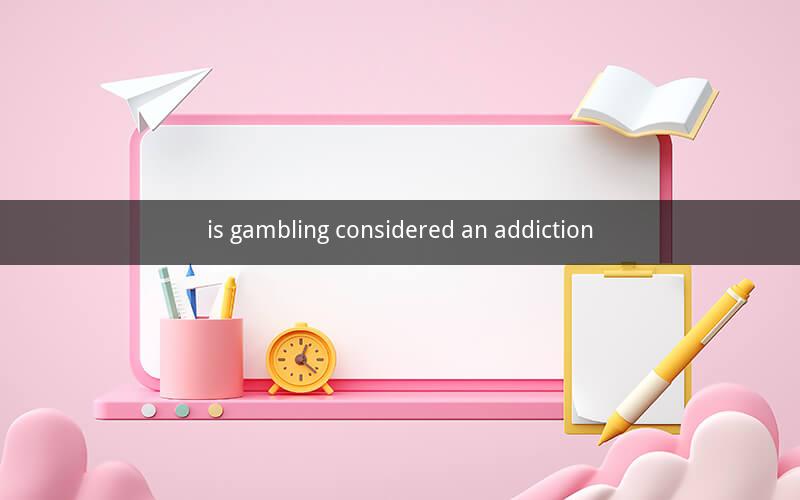
Contents
1. Introduction to Gambling
2. Defining Addiction
3. Is Gambling an Addiction?
4. The Science Behind Gambling Addiction
5. Signs and Symptoms of Gambling Addiction
6. The Impact of Gambling Addiction on Individuals and Society
7. Treatment and Support for Gambling Addiction
8. Prevention and Education
9. Conclusion
10. Frequently Asked Questions
1. Introduction to Gambling
Gambling has been a part of human culture for centuries, with various forms and activities ranging from lottery tickets to high-stakes poker games. It is a popular pastime for many, offering excitement and the chance to win money. However, the line between recreational gambling and problem gambling can be blurred, leading to debates on whether gambling should be considered an addiction.
2. Defining Addiction
To determine whether gambling is an addiction, it is essential to understand the concept of addiction itself. Addiction is a chronic disease characterized by compulsive engagement in rewarding stimuli despite adverse consequences. It is often categorized into substance use disorders and behavioral addictions, with gambling being classified as a behavioral addiction.
3. Is Gambling an Addiction?
Yes, gambling can be considered an addiction. According to the American Psychiatric Association (APA), gambling disorder is a mental health condition that meets the criteria for addiction. It is characterized by persistent and recurrent problematic gambling behavior that causes significant distress or impairment in personal, family, or professional functioning.
4. The Science Behind Gambling Addiction
The science behind gambling addiction is complex and involves various factors, including neurobiological, psychological, and social aspects. Studies have shown that certain brain regions, such as the nucleus accumbens and prefrontal cortex, are involved in the reward and decision-making processes associated with gambling. Additionally, genetic predisposition, environmental factors, and co-occurring mental health disorders can contribute to the development of gambling addiction.
5. Signs and Symptoms of Gambling Addiction
Identifying gambling addiction can be challenging, as individuals may not always recognize their problem. However, some common signs and symptoms include:
- Preoccupation with gambling, spending increasing amounts of time and energy on it
- Needing to gamble more money to achieve the desired thrill
- Feeling restless or irritable when attempting to cut down or stop gambling
- Repeated unsuccessful attempts to control, cut back, or stop gambling
- Continuation of gambling despite negative consequences, such as financial, relationship, or occupational problems
6. The Impact of Gambling Addiction on Individuals and Society
Gambling addiction can have devastating consequences for individuals and society. It can lead to financial ruin, relationship breakdowns, legal problems, and even suicide. On a broader scale, gambling addiction can contribute to increased crime rates, reduced productivity, and social instability.
7. Treatment and Support for Gambling Addiction
Treatment for gambling addiction involves a combination of therapeutic approaches, such as cognitive-behavioral therapy (CBT), motivational interviewing, and support groups. Medications may also be used to address co-occurring mental health disorders. Treatment should be tailored to the individual's specific needs and may involve ongoing support to maintain recovery.
8. Prevention and Education
Preventing gambling addiction starts with education and awareness. By understanding the risks and consequences of gambling, individuals can make informed decisions. Prevention strategies include promoting responsible gambling, identifying vulnerable populations, and implementing regulations to protect vulnerable individuals.
9. Conclusion
Gambling addiction is a serious mental health condition that can have far-reaching consequences for individuals and society. Recognizing the signs and symptoms, seeking treatment, and promoting prevention and education are crucial steps in addressing this issue.
10. Frequently Asked Questions
1. What is the difference between problem gambling and gambling addiction?
- Problem gambling refers to any gambling behavior that causes distress or harm, while gambling addiction is a chronic disease characterized by compulsive engagement in gambling despite adverse consequences.
2. Can gambling addiction be cured?
- While there is no cure for gambling addiction, it can be effectively managed through treatment and support.
3. Are there genetic factors that contribute to gambling addiction?
- Yes, research has shown that genetic factors can play a role in the development of gambling addiction.
4. Can medication help treat gambling addiction?
- Medications may be used to address co-occurring mental health disorders or to reduce cravings, but they are not a cure for gambling addiction.
5. Is online gambling more addictive than traditional gambling?
- Online gambling can be more addictive due to its accessibility and the ability to gamble for longer periods without leaving the house.
6. Can gambling addiction be prevented?
- Yes, prevention strategies include promoting responsible gambling, identifying vulnerable populations, and implementing regulations to protect vulnerable individuals.
7. How can I help someone with a gambling addiction?
- You can offer support, encourage them to seek treatment, and help them develop healthy coping strategies.
8. What is the most effective treatment for gambling addiction?
- The most effective treatment for gambling addiction is a combination of therapeutic approaches, such as cognitive-behavioral therapy (CBT), motivational interviewing, and support groups.
9. How long does treatment for gambling addiction last?
- Treatment for gambling addiction can vary in duration, depending on the individual's needs and response to treatment.
10. Can a person recover from gambling addiction?
- Yes, with the right treatment and support, individuals can recover from gambling addiction and lead a fulfilling life.